Nerve Relaxing Herbs for Anxiety, to Relieve Tension & Promote Emotional Health
Having been an anxiety/panic attack sufferer myself I am happy to promote healthy ways to try to stay calm. Even though spirituality has been my way out of the nightmare, I fully support herbs as part of a healthy method for healing. Below I list 6 herbs that can help you cope with those moments of anxiety/panic attacks. See which one in particular ‘speaks’ to you and give it a try.
I used to take valium to relax my nerves for too many years. Coming off valium was a HORRENDOUS experience (6 weeks of absolute torture) but I feel incredibly proud of the initiative (which funnily enough came around the time my dad died, I believe he gave me a helping hand from the other side). This is also the time I wanted to stop drinking alcohol (which I also used for too many years to help calm my nerves). Basically, I was a total mess.
I just didn’t know any better. My anxiety levels shot to the roof back in 1999 and I went through a 5 year panic/anxiety attack period. Yes, it did last -uninterruptedly- for 5 long, long years. Afterwords, it was an on/off anxiety attack (on a daily basis) I tried to cope with via the aid of pills and alcohol.
Nowadays it is a different story. There’s the fact that I went through a solid spiritual awakening back in the summer of 2017 and I believe that having had desperately fallen on my knees asking for help had a lot to do with it.
Valium and alcohol had become my only way out of the disabling anxiety (only for brief periods of time) til I found incredible long lasting peace with the herbal teas I would drink at AA meetings together with a spirituality that deepened over the years til my final awakening in 2017.
Enough of my story and let’s move on to nerve relaxing herbs for anxiety. To be honest, I don’t really need to take them since I live in constant peace and deep, fulfilling happiness (awakening to my True Being has been the key here!!) but I do think that, in general, being in relationship with these types of herbs can enhance our sense of peacefulness and wellbeing. My body does to through tense moments here and there from past habits and immediate fear comes to the surface but it usually dissipates rather quickly.
I’ve added affiliate links to my list of herbs which means I’ll get a commission if you purchase through the links at no extra cost to you. This is how I help support this website and the work I do on it. Check out my disclaimer here.
What are Relaxing Nervine Herbs?
Nervines are herbs that affect our nervous system. For example, coffee can stimulate our nervous system and ‘wake us up’. On the other hand, relaxing nervine herbs help relax constricted tissues via our nervous system.
Different herbs will help in different ways by for example enhancing our mood, lifting depressive states, promoting deep sleep, relaxing our mind, etc.
When Should I Take a Nerve Relaxing Herb?
There are many different situations where you’ll find yourself wanting the aid of herbs to help you with a current state. You might feel restless, hyperactive, depressed, etc. Maybe you have asthma, you have muscle spasms or suffer from insomnia. Relaxing nervine herbs can help with all of these states and more.
I study different herbal courses because I find myself confused regarding all the different actions herbs have and wonder which herb is best for me, and, how to choose one over another. For example, if I decide I’d like to take a calming herb after a copious dinner (I do tend to get a little anxiety spike if I eat too much, which is about the only time I get it nowadays), which herb do I know will work best to help relieve this particular problem?
Choosing the right herb is a science in itself and I don’t have enough knowledge to tell you which one is the best for you. This is something you’ll have to find out through a private herbalist or maybe use your instinct (this is the way I do it), always watching out and being extra careful because herbs have potent chemicals and can be dangerous when we don’t know what we’re doing.
If you feel happy to go ahead and try a few options to see which one works best for you, check out the list of herbs I listed below. You could try one at a time and see how you feel about it (check out how it tastes, how you feel immediately after taking it and also after a few hours of taking it, have a look of images of the plant online, look at photos of the flowers, the colours, does a particular plant speak to you? etc etc). The idea is that you enter into a relationship with the plant rather than just taking it to help you with your anxiety or nerves without knowing where the medicine comes from. This would be very much like asking for aspirin over the counter and taking it to help you with a headache. There’s no connection with life, with the source of the medicine, with the plant itself when you take medicine this way.
This disconnection is also a disconnection with oneself. This is why it is very important to get to know the plants that heal you.
Only recently I smelled sage and immediately entered into a relationship with it (let’s call it love at first scent). Afterwords, I found out sage is the perfect herb for menopause so, as you can see, my body knew this and told me to take it!
Linden (Tilia spp.)

The reason this herb is first on my list is because where I’m from (Tenerife, Canary Islands in Spain, Europe) it is the one we would use to calm nerves.
In fact, we wouldn’t use any other, only linden tea. I remember having my piano exams back in the day (they were quite tough and I was incredibly nervous!) and my mum giving me a huge 1 litre jug of linden tea: “Take it!” She would say… “It will calm your nerves”. I can’t remember it working straight away, but I do remember thinking after a while: “hm, I’m not as nervous as I was before… Maybe this stuff works!”.
Either way, this is the tea everyone takes here in Tenerife when they want to calm down feelings of nervousness (nervous shakes, mild panic attacks, etc).
Besides being used for anxiety and nervous tension, linden is often used for colds, flus and bronchitis. Just so you know : )
Here’s linden tea on Amazon if you’d like to try it.
Chamomile (Matricaria recutita or Matricaria chamomilla)

Another herb very close to my heart. When I was growing up we would use chamomile flowers infused tea to calm an upset stomach. I can now see all herbs that are good for bringing down inflammation or body heat (inflamed stomach, bringing down a fever, etc etc) are also good for calming down ‘inflamed’ nerves if that makes sense (it does to me!).
In other words, they seem to work at many layers when it comes to relaxing, calming down or acting as anti-inflammatory (all of the same nature if you come to think about it).
This makes chamomile a great herb for flu as well (I listed it here as one of the top 4 herbs for flu); fantastic for hot, restless fevers, sore throats and congestion.
Here’s chamomile flowers on Amazon if you’d like to try it.
Valerian (Valeriana officinalis)
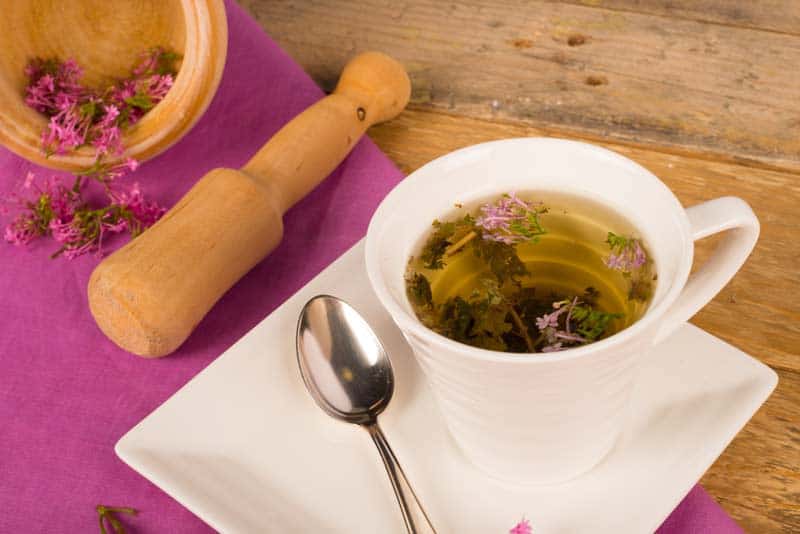
Valerian is truly the go-to herb when it comes to the nervous system. I used to decoct it for my ex so she could relax but I found out that it is best to steep it gently at a relatively low temperature in order to avoid destroying the oils which are believed to be most effective.
Valerian is an anxiolytic, anti-depressant, anti-convulsant and neuroprotective amongst other benefits. A mild sedative, it can be effective when it comes to helping with sleep. The effects of valerian are attributed to its compounds valeric acid and valepotriates which are exclusive to this herb.
Here’s valerian root on Amazon if you’d like to try it.
St. John’s Wort (Hipericum perforatum)
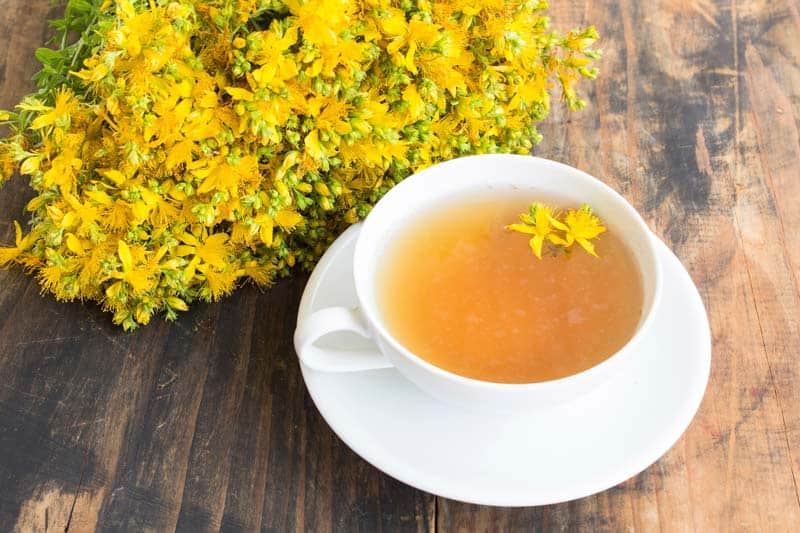
A bitter, astringent and cool herb, St John’s wort has a nervine action. Used as herbal medicine for thousands of years, this relaxing nervine is well-known because it can relieve tension as well as anxiety. I first came across St John’s wort when I was given antidepressants back in the year 2,000. The chemist at Boots in the UK told me it is used for mild to moderate depression. At the time I might have tried St. John’s wort to help me with my depression although I can’t remember.
Careful if you’re thinking of trying St John’s wort because it can interfere with other medicines so please do consult a herbalist or doctor before taking it if you’re on any type of medication. Check this article and also do some more reading if necessary around this issue.
Here’s St. John’s wort on Amazon if you’d like to try it.
Lavender (Lavandula spp.)
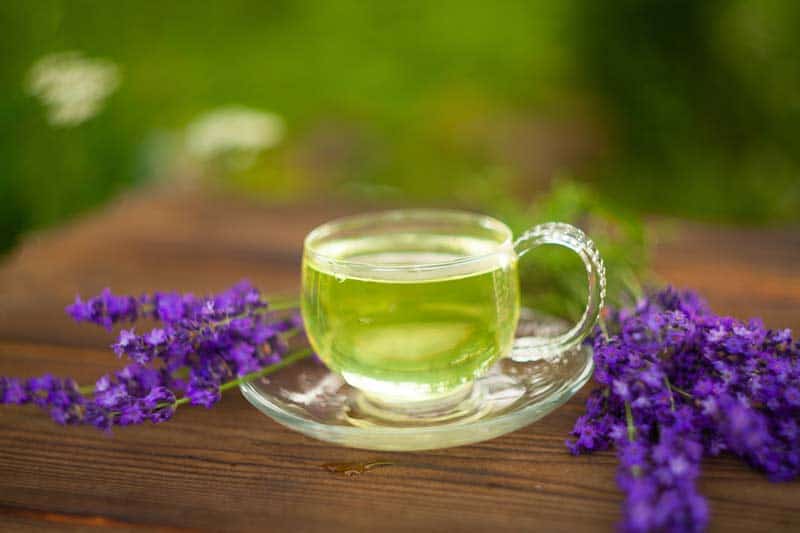
Lavender’s volatile oils are antibacterial and its aroma is effective at repelling mosquitos, moths and flies. Lavender flower bud sachets can be a great addition to any clothes drawer or tucked into the corner of your wardrobe.
Besides smelling absolutely wonderful (well, I love it); lavender shines when it comes to its nervine action. It can be effective against anxiety, insomnia and mild depression. Just by looking at the lavender growing in la finca I feel my spirits getting uplifted. The smell also helps me feel alive and content, balancing my emotions and giving me a sense of vitality.
At night, I sometimes directly inhale the essential oil for around 2 to 3 minutes and/or burn 4 to 8 drops in my diffuser because lavender helps with sleep. Drinking lavender tea can help relax and calm an anxious mind.
Here’s lavender on Amazon if you’d like to try it.
Sage (Salvia spp.)
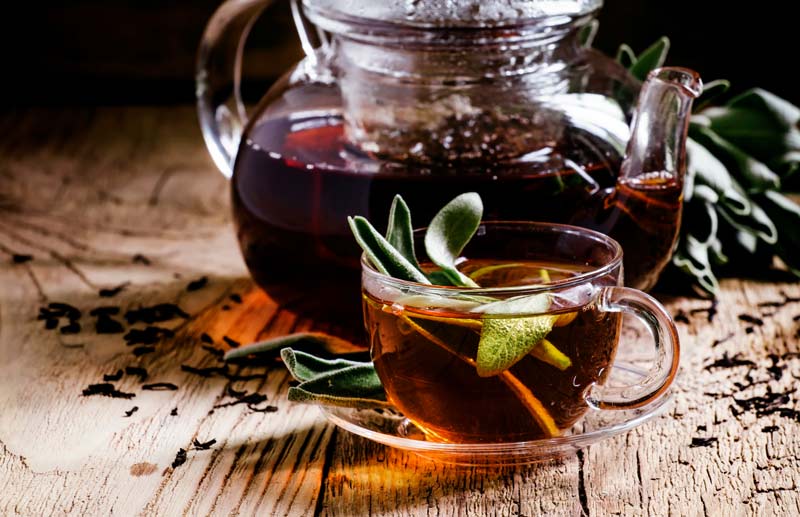
With over 500 varieties, Salvia officinalis has been used for a long time when it comes to herbal medicine. Sage is the first herb I fell in love with when I started my menopause (I mentioned it before but in case you didn’t read it, my relationship with sage was a kind of accident, where one day I smelled the leaf of a sage plant and my body went crazy! I suddenly needed to touch it, smell it, drink it…). You can check about sage tea for menopause here, here and here.
As a nervine, sage is great for anxiety. Although I’ve never taken sage as a nervine herb I will give it a try after a copious meal, which is when I can get that tiny bit of annoying physical anxiety (my heart beats faster because it’s probably also pumping faster as my stomach is trying to digest the food).
Here’s sage on Amazon if you’d like to try it.
Holy Basil (Ocimum sanctum)
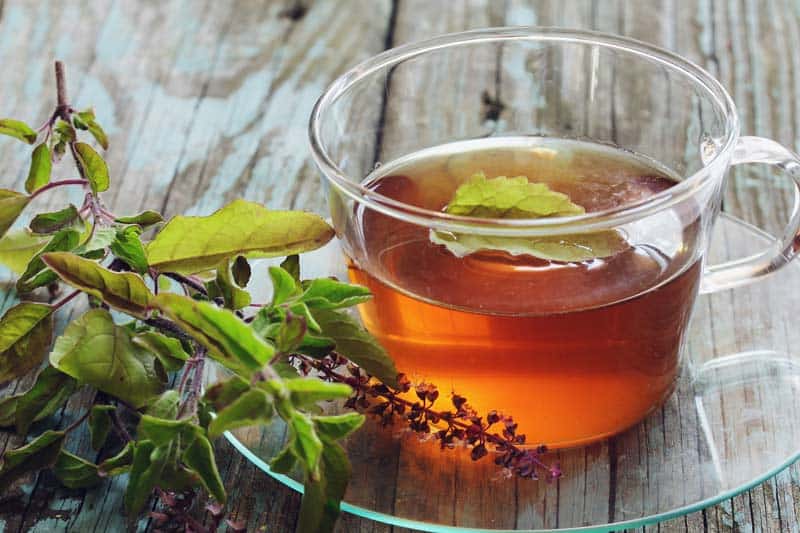
Energetically a warming/cooling with a pungent taste, as a nervine holy basil (tulsi) is at first a stimulating herb, but afterwords it gives a sense of calmness and groundedness helping to quiet an anxious mind. It can regulate the nervous system moving blocked and restless energy to help with the inability to concentrate.
It can help move stuck energy in the energetic nervous system (for example, after a situational trauma). It has an anxiolytic action which helps with anxiety. If your anxiety is related to a depressive state due to some sort of trauma I would try tulsi and see how it goes.
By the way, I’ve been given a tiny little tulsi herb in a pot recently, I hope it grows into a beautiful plant as I’ve heard wonders about this wonderful herb.
Here’s holy basil (tulsi) on Amazon if you’d like to try it.
Try Them to See Which One is The Right One For You…
The above herbs are great for calming nerves, relaxation, panic attacks, anxiety episodes, they can help with general stress, calm down the body, they are natural sedatives and can also help to feel happier.
As mentioned at the beginning of this post, what really helped relax my horrendous 11 year long anxiety/panic attack was my introduction to spirituality and deepening my understanding around it over the years. In fact, very early on after I explored the spiritual avenue, my anxiety attack disappeared to 100% (it was like a miracle, literally). Prayer, meditation, willingness to surrender and rigorous 12 step work erased my anxiety within 6 to 8 weeks of practice after such a long battle for sooo many years. This was the way in which an illness (which I know now is a spiritual illness) left my body for good, but we’re talking about an extreme case which hopefully is not your experience.
Obviously I tried doctors, psiciatrists, all sorts of anti-depressants, and a long list of etceteras (alongside valium and alcohol) but NOTHING worked for me. Medication would do the job for a little while (sometimes just a couple of hours) and then, back to full-mode panic attack (I would also violently throw up at times because of how severe my anxiety was).
I didn’t try using herbs as a remedy and I don’t think they would have worked for me. Nowadays herbs are my companions and I couldn’t envision a life without them but there’s been a journey for me to get where I am. No doubt I would lovingly choose one to three herbs to help me with a mild panic attack or anxiety episode if needed. I would probably choose linden tea because I was brought up culturally with it and mix it with either St. John’s wort or tulsi if my anxiety had a tinge of depression alongside it. The thing is that you’ll have to find the herb(s) that works for you and this might take time, patience and a few failures.
I’m new to herbs and I know it’ll take time for me to ‘get good’ with them. The rest of my life is probably not enough time for me to learn the basics around herbalism. But with the love I feel towards them together with the solid foundation I have in my Self because of my awakening I’m sure I’ll get quite good at this in this lifetime : ) And, most importantly, I’m enjoying every single second of it.
My advice? Test, enjoy, live the moment and surrender to whatever the body feels like feeling. This works for me every second of the day!
Patri xx

I’ve been looking for this kind of article is great and let me help someone, how i end anxiety and panic attacks here: https://bit.ly/2KYwZ5H